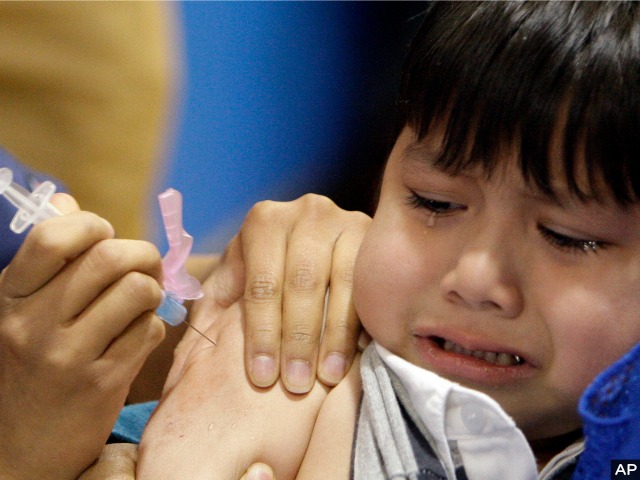This morning’s key headlines from GenerationalDynamics.com:
- H1N1 swine flu spread in Michigan and Texas revives fears of pandemic
- Nearly one million people homeless in Central African Republic
- IMF working paper predicts major global financial crisis
- Was North Korea’s Kim Jong-un’s uncle eaten by ravenous dogs?
H1N1 swine flu spread in Michigan and Texas revives fears of pandemic
The number of people hospitalized with cases of H1N1 swine flu isclimbing in the area of Ann Arbor, Mich., area, following a series ofH1N1 deaths in eastern Texas, raising fears of a repeat of the2009-2010 H1N1 pandemic, this time with a mutated virus that’s moredeadly. The last H1N1 pandemic ran from April, 2009 to May 2010, andkilled at least 18,000 people, though though some estimates run intothe hundreds of thousands. Mexico City was particularly hard hit, andthe city was all but shut down for several months.
The fear in 2009, and again today, is a repeat of the huge Spanish flupandemic that took tens of millions of lives in 1918-19, decimatingentire communities. (See “Rapid worldwide H1N1 swine flu spread is raising big concerns for the Fall” from 2009.) The 2009 pandemic fizzled without causingmassive numbers of death, but the world is overdue for a massivepandemic, and the possibility cannot be excluded now. Michigan Live and Recombinomics
Nearly one million people homeless in Central African Republic
According to Doctors Without Borders, “fighting, lynchings and violentattacks remain a daily occurrence in Bangui,” the capital of CentralAfrican Republic (CAR), “where the situation appears to be out ofcontrol.” The number of people driven from their homes in Banguialone was around 700,000 a week ago, and is now close to one million.These are people who have fled their homes in the sectarian violencebetween Muslims and Christians in Bangui alone. There do not seem tobe figures for the rest of the country. France has deployed 1,600peacekeeping troops to Bangui, supplemented by about 6,000 AfricanUnion peacekeeping troops. C.A.R. is deep into a generational Crisisera, so it’s quite possible that these peacekeeping troops will beunable to keep the peace, and that C.A.R. will repeat the genocidalbloodletting of Rwanda in 1994. Doctors Without Borders and AFP
IMF working paper predicts major global financial crisis
Mainstream economists are generally becoming increasinglyalarmed by the imbalances in the global economy, whetherfrom a stock market bubble or from historically high publicdebt, and are expressing increasing concern about a majorfinancial crisis. In an IMF working paper,economists Carmen M. Reinhart and Kenneth S. Rogoff particularlycriticize national governments’ wishful thinking thatdebt can be ignored because it will be eliminated automaticallyby a spurt of economic growth. According to the report:
Even after one of the most severe crises on record(in its fifth year as of 2012) in the advanced world, the receivedwisdom in policy circles clings to the notion that advanced,wealthy economies are completely different animals from theiremerging market counterparts. Until 2007-08, the presumption wasthat they were not nearly as vulnerable to financial crises.2 Whenevents disabused the world of that notion, the idea stillpersisted that if a financial crisis does occur, advancedcountries are much better at managing the aftermath, thanks totheir ability to vigorously apply countercyclical policy. Even asthe recovery consistently proved to be far weaker than mostforecasters were expecting, policymakers continued tounderestimate the depth and duration of the downturn…
It is certainly true that policymakers need to manage publicexpectations. However, by consistently choosing instruments andcalibrating responses based on overly optimistic medium-termscenarios, they risk ultimately losing credibility anddestabilizing expectations rather than the reverse. Nowhere isthe denial problem more acute than in the collective amnesia aboutadvanced country deleveraging experiences (especially, but notexclusively, before World War II) that involved a variety ofsovereign and private restructurings, defaults, debt conversions,and financial repression. This denial has led to policies that insome cases risk exacerbating the final costs ofdeleveraging.
The paper points out that, “In fact, going back to 1800, the currentlevel of central government debt in advanced economies is approachinga two-century high-water mark.” With debt higher than it’s been in200 years, a major financial crisis will not be far off.
The paper warns that savers will face “haircuts” in the form ofnegative interest rates and cancellation of government debt. IMF (PDF)and Telegraph (London)
Was North Korea’s Kim Jong-un’s uncle eaten by ravenous dogs?
Jang Song-thaek, the uncle of North Korea’s child dictator Kim Jong-unwas executed in a particularly gruesome manner, according to a reportin Hong Kong’s strong pro-Beijing newspaper Wen Wei Po. According tothe report, Jang and his five closest aides were stripped naked andthrown live into a cage with 120 hunting hounds that had been starvedfor five days. According to the newspaper, Jang and his aides werepaper is a Beijing mouthpiece, the story may indicate the contemptthat Chinese officials are expressing for the current North Koreangovernment. NBC News
Permanent web link to this article
Receive daily World View columns by e-mail

COMMENTS
Please let us know if you're having issues with commenting.